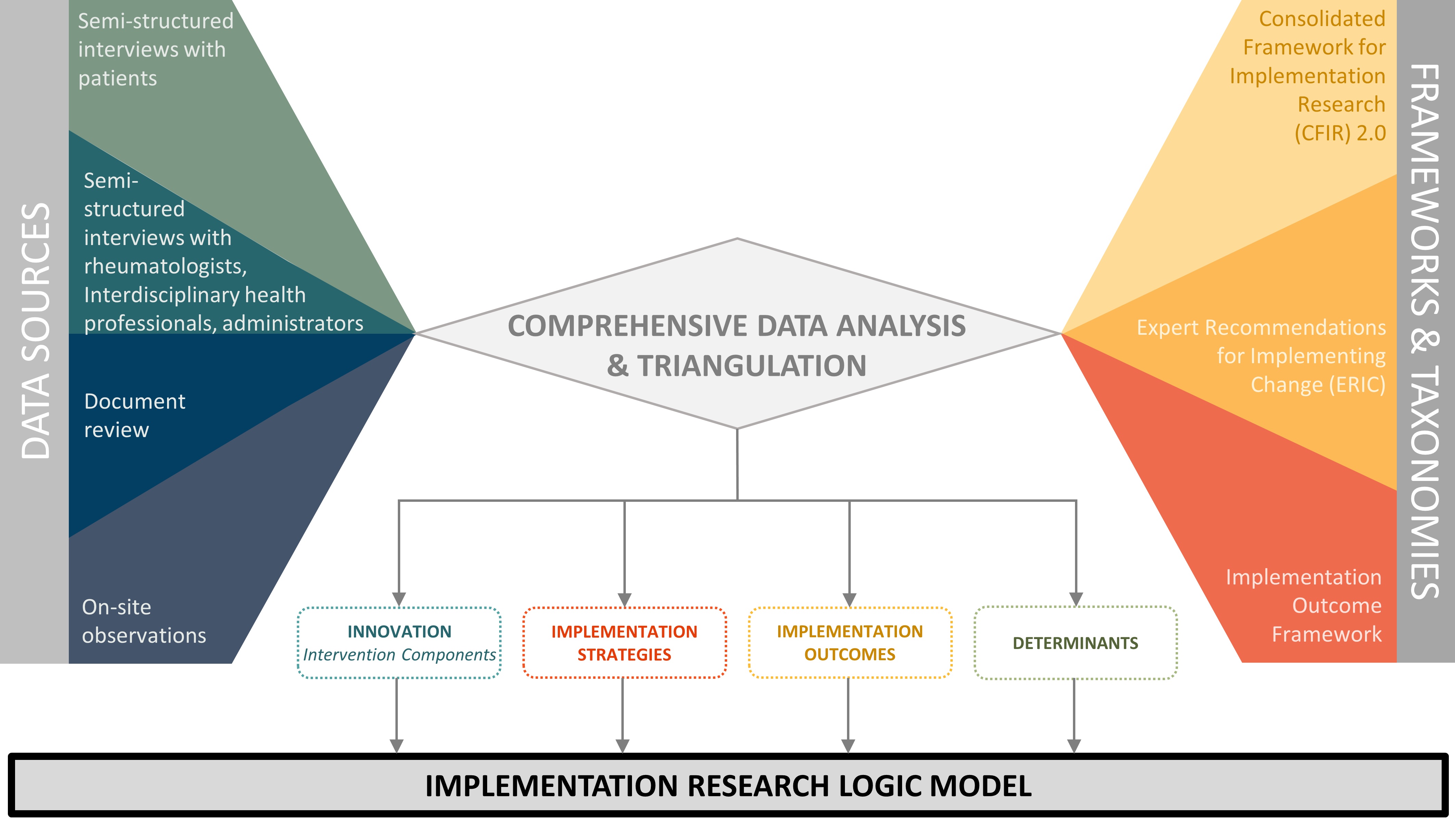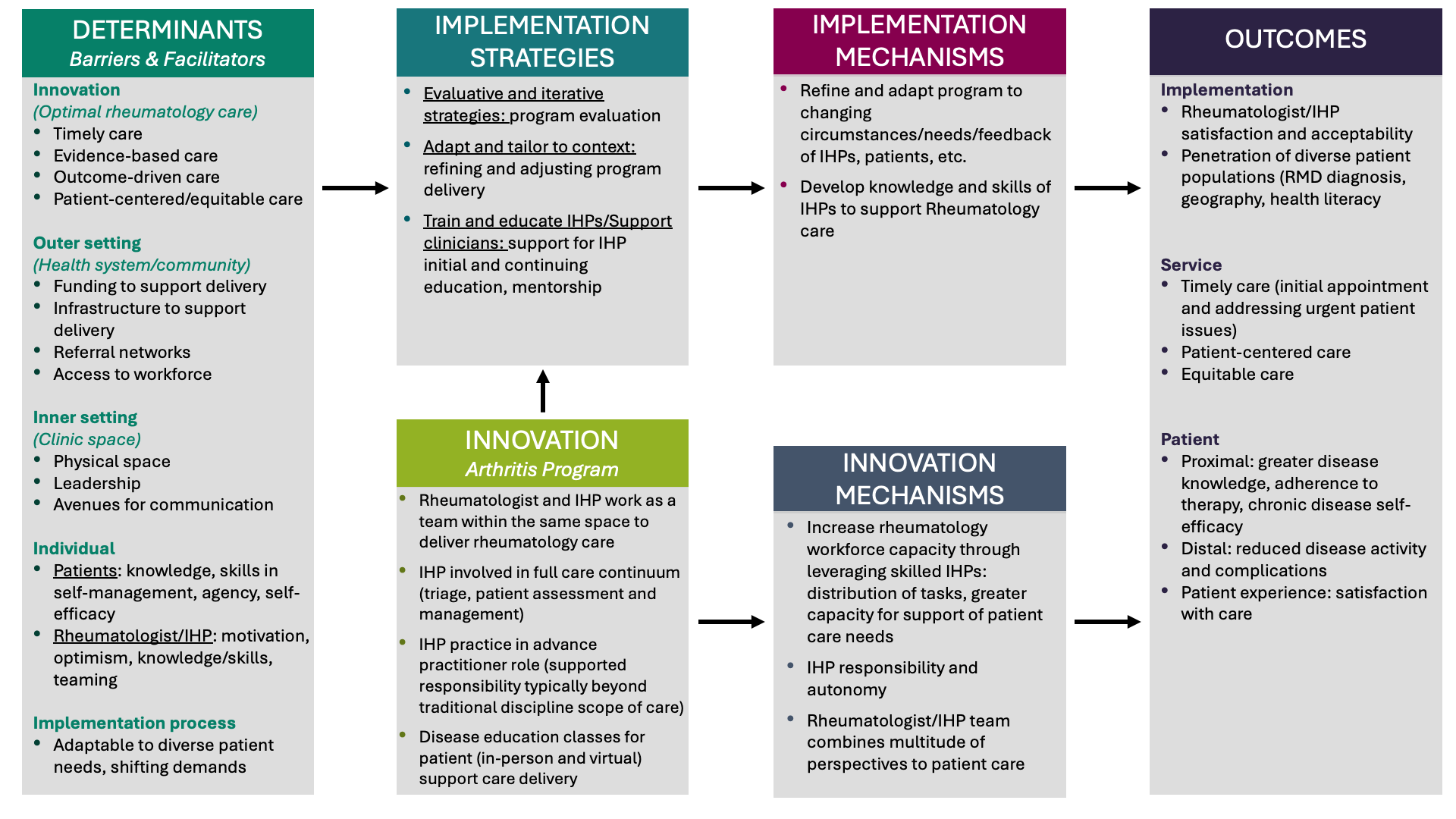Session Information
Session Type: Poster Session B
Session Time: 10:30AM-12:30PM
Background/Purpose: The increasing prevalence of RMDs has resulted in a demand for care that surpasses the supply of rheumatologists, necessitating innovative care models to provide timely and effective treatment. Interdisciplinary team-based models of rheumatology care, involving rheumatologists working with interdisciplinary health professionals (IHPs), have shown promise in improving quality of RMD management and patient outcomes. An understanding of the key components of successful interdisciplinary team-based rheumatology care, and how they operate to achieve their effects, remains elusive and is crucial to facilitate spread and scale of this care model. Our objective was to elucidate the program theory underlying the Centre for Arthritis Excellence (CArE), the only provincially funded community-based interdisciplinary team-based model of rheumatology care in Ontario, Canada.
Methods: We conducted an exploratory case study of CArE guided by the Medical Research Council Framework for Developing and Evaluating Complex Interventions. We focused on the interaction with context, the underpinning program theory (how and why it achieves its intended outcomes), and diverse stakeholder perspectives. We collected data through semi-structured interviews with CArE patients (n=9) and health professionals (rheumatologists n=3, IHPs n=6, and administrators n=1), naturalistic observations (n=3), and relevant document review (n=32). Framework analysis was informed by the Consolidated Framework for Implementation Research 2.0, Expert Recommendations for Implementing Change, and the Implementation Outcomes Framework. We triangulated learnings to construct a program theory following an implementation research logic model (IRLM). We present our study’s conceptual framework in Figure 1.
Results: The CArE interdisciplinary model involved rheumatologists and IHPs (including physical therapists, occupational therapists, and pharmacists) working within the same physical space, the same patient medical record system, sharing responsibilities along the continuum of rheumatology care from initial referral and throughout follow-up. Actioning this model distributed responsibilities away from the rheumatologist and enabled greater capacity for timely patient visits and comprehensive, person-centered care. Provision of ongoing training and mentorship to the IHPs was critical for their skill development and functioning within the rheumatology environment, and in turn, led to greater IHP autonomy and satisfaction. IHPs’ delivery of disease education to patients supported patient disease knowledge and self-efficacy, enabling improved self-management. The ongoing evaluation, refinement and adaptations of the model supported changing care needs. We present an IRLM of CArE in Figure 2.
Conclusion: By elucidating and articulating the program theory of CArE, this study has provided insights into the critical components and contextual factors that contribute to successful delivery of interdisciplinary team-based rheumatology care. The findings will support the adoption, spread and scale of effective team-based models, aiming to improve the quality of care for individuals with RMDs.
To cite this abstract in AMA style:
King L, To D, Ladak Z, Barnes C, Hofstetter C, Thorne C, Oliva L, Ivers N, Widdifield J, Laur C. Elucidating the Program Theory of a Successful Interdisciplinary Team-Based Model of Rheumatology Care: An Exploratory Case Study [abstract]. Arthritis Rheumatol. 2024; 76 (suppl 9). https://acrabstracts.org/abstract/elucidating-the-program-theory-of-a-successful-interdisciplinary-team-based-model-of-rheumatology-care-an-exploratory-case-study/. Accessed .« Back to ACR Convergence 2024
ACR Meeting Abstracts - https://acrabstracts.org/abstract/elucidating-the-program-theory-of-a-successful-interdisciplinary-team-based-model-of-rheumatology-care-an-exploratory-case-study/


